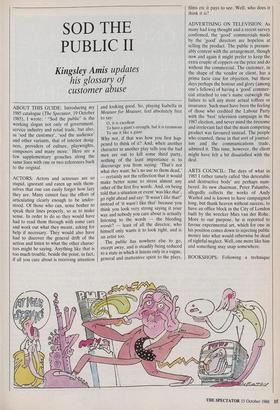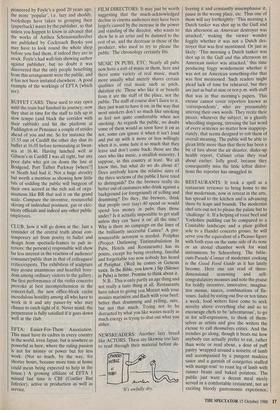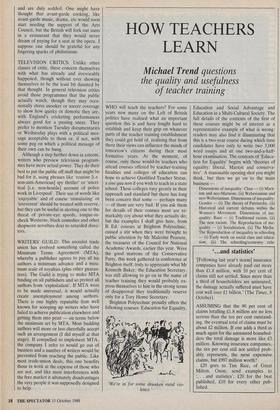SOD THE PUBLIC II
Kingsley Amis updates
his glossary of customer abuse
ABOUT THIS GUIDE: Introducing my 1985 catalogue (The Spectator, 19 October 1985), I wrote: "Sod the public" is the working slogan not only of government, service industry and retail trade, but also, as 'sod the customer', 'sod the audience' and other variants, that of interior desig- ners, providers of culture, playwrights, composers and many more.' Here are a few supplementary grouches along the same lines with one or two references back to the original.
ACTORS: Actors and actresses are so stupid, ignorant and eaten up with them- selves that one can easily forget how lazy they are. Many cannot face the effort of articulating clearly enough to be under- stood. Of those who can, none bother to speak their lines properly, so as to make sense. In order to do so they would have had to read them through with some care and work out what they meant, asking for help if necessary. They would also have had to discover the general drift of the action and listen to what the other charac- ters might be saying. Anything like that is too much trouble, beside the point, in fact, if all you care about is receiving attention
and looking good. So, playing Isabella in Measure for Measure, feel absolutely free to say: 0, it is excellent To have a giant's strength, but it is tyrannous To use it like a giant.
Why not, if that was how you first hap- pened to think of it? And, when another character in another play tells you the bad men are out to kill some third party, nothing of the least importance is to discourage you from saying: 'That's not what they want; he's no use to them dead,' — certainly not the reflection that it would make better sense to stress almost any other of the first five words. And, on being told that a situation or event 'was like that', go right ahead and say: 'It wasn't like that!' instead of 'it wasn't like that' because you think you look very strong saying it your way and nobody you care about is actually listening to the words — the bleeding words? — least of all the director, who himself only wants it to look right, and is an artist too.
The public has nowhere else to go, except away, and is steadily being reduced to a state in which it listens only in a vague, general and inattentive spirit to the plays, films etc it pays to see. Well, who does it think it is?
ADVERTISING ON TELEVISION: As many had long thought and a recent survey confirmed, the 'good' commercials made by the 'good' directors are hopeless at selling the product. The public is presum- ably content with the arrangement, though now and again it might prefer to keep the extra couple of coppers on the price and do without the commercial. The customer, in the shape of the vendor or client, has a prima facie case for objection, but these days perhaps the honour and glory (among one's fellows) of having a 'good' commer- cial attached to one's name outweigh the failure to sell any more actual toffees or insurance. Such must have been the feeling of those who credited the Labour Party with the 'best' television campaign in the 1987 election, and never mind the tiresome and irrelevant fact that the main competing product was favoured instead. The people who counted, those in that sort of journal- ism and the communications trade, admired it. This time, however, the client might have felt a bit dissatisfied with the deal.
ARTS COUNCIL: The days of what in 1985 I rather tamely called 'this detestable and destructive body' are perhaps num- bered. Its new chairman, Peter Palumbo, allegedly collects the works of Andy Warhol and is known to have campaigned long, but thank heaven without success, to have an office block in the City of London built by the wrecker Mies van der Rohe. More to our purpose, he is reported to favour experimental art, which for one in his position comes down to injecting public money into what would otherwise be dead of rightful neglect. Well, one more like him and something may snap somewhere.
BOOKSHOPS: Following a technique pioneered by Foyle's a good 20 years ago, the more 'popular', i.e. lazy and shoddy, bookshops have taken to grouping their (paperback) wares by the publisher, so that unless you happen to know in advance that the works of Anthea Scheissenschreiber are published by Cockroach Books you may have to look round the whole shop before you find them, if indeed they are in stock. Foyle's had wall-lists showing author against publisher, but no doubt it was discovered that the only people benefiting from this arrangement were the public, and it has not been imitated elsewhere. A good example of the workings of EFTA (which see).
BUFFET CARS: These used to stay open until the train had finished its journey; now they shut in time for the staff to tidy up in slow tempo (and block the corridor with their rubbish) and hit the platform at Paddington or Penzance a couple of strides ahead of you and me. So for instance the 15.53 out of Cardiff the other day shut its buffet at 16.05 before terminating at Swan- sea at 16.46. Having lunched well at Gibson's in Cardiff I was all right, but any poor dabs who got on down the line at Bridgend, Port Talbot Parkway [where?] or Neath had had it. Not a huge atrocity but worth a mention as showing how little bits of sodding the public will burgeon of their own accord in the rich soil of orga- nisations like BR that sod it on the grand scale. Compare the inventive, resourceful skiving of individual postmen, gas or elec- tricity officials and indeed any other public employees.
CLUB, how it will go down at the: Just a reminder of the central truth about con- temporary art from poetry to ballet and design from spectacle-frames to pub in- teriors: the person(s) responsible will show far less interest in the reaction of audience/ consumer/public than in that of colleagues/ critics/experts. The exhibition of sculpture may arouse unanimous and heartfelt bore- dom among ordinary visitors to the gallery, the first performance of the violin concerto provoke at best incomprehension in the concert-hall, the new office-block excite incredulous hostility among all who have to work in it and any passer-by who may chance to catch sight of it. Never mind; the Perpetrator is fully satisfied if it goes down well at the club.
EFTA: Easier-For-Them Association. This must have its cadres in every country in the world, even Japan, but is nowhere as powerful as here, where the ruling passion is not for money or power but for less work. (Not so much, by the way, for shorter hours, because more time at home could mean being expected to help in the house.) A growing affiliate of EFTA I missed last time is CBI (Costlier But Inferior), active in production as well as service. FILM DIRECTORS: It may just be worth suggesting that the much-acknowledged decline in cinema audiences may have been largely caused by the increase in the power and standing of the director, who wants to show he is an artist and be damned to the rest of us, and the decrease in those of the producer, who used to try to please the public. The chronology certainly fits.
MUSIC IN PUBS, ETC: Nearly all pubs now have a sort of music in them, here and there some variety of real music, much more usually what merely shares certain qualities of real music such as pitch, duration etc. Those who like it or benefit from it are the staff of the place, not the public. The staff of course don't listen to it, they just want to have it on, in the way that most smokers don't so much like smoking as feel not quite comfortable when not smoking. As regards the public, no doubt some of them would as soon have it on as not, some can ignore it when it isn't loud and put up with it more or less willingly when it is, some hate it so much that they leave and don't come back: those are the ones who like music, a smallish minority, I suppose, in this country at least. We all know this, but what do we do about it? Does anybody know the relative sizes of the three sections of the public I have tried to distinguish? Do the brewers really do better out of customers who drink against a background (or foreground) of yelling and drumming? Do they, the brewers, think that people over (say) 40 spend or would spend less money in pubs than those under? Is it actually impossible to get staff unless they can 'have it on' all the time? Why is there no campaign on the lines of the brilliantly successful Camra? A pro- nounceable acronym is needed. Potiphar (Project Outlawing Tintinnabulation In Pubs, Hotels and Restaurants) has its points, except for being overlong, fanciful and forgettable too now nobody has heard of Potiphar. (Well he comes in Genesis xxxix. In the Bible, you know.) Sip (Silence in Pubs) is better. Promise to think about it. N.B.: This is only partly an age thing and not really a taste thing at all. Restaurants have taken to giving you Mozart with your moules mariniere and Bach with your beef: better than drumming and yelling, sure, but not that much. Trying not to be distracted by what you like wastes nearly as much energy as trying to shut out what you abhor.
NEWSREADERS: Another lazy breed like ACTORS. These are likewise too lazy to read through their material before de- 'It's awfully dry.' livering it and constantly misemphasise it, pause in the wrong place, etc. Thus one of them will say forthrightly: 'This morning a Dutch tanker was shot up in the Gulf and this afternoon an American destroyer was attacked,' making the viewer wonder foggily whether it was not a Dutch des- troyer that was first mentioned. Or just as likely: 'This morning a Dutch tanker was shot up in the Gulf and this afternoon an American tanker was attacked,' this time producing foggy wonderment whether it was not an American something-else that was first mentioned. Such readers might plead lack of time for rehearsal, but they are just as bad at nine or ten p.m. with stuff that was in that morning's papers. This excuse cannot cover reporters known as 'correspondents', who are presumably uttering their own words. They recite their pieces, whatever the subject, in a ghastly wheedling singsong, stressing the last word of every sentence no matter how inapprop- riately, that seems designed to rob them of overall meaning. The public will be able to glean little more than that there has been a bit of fuss about the air disaster, shake-up health report, Cabinet crisis they read about earlier. Jolly good, because they consequently miss the little leftist distor- tions the reporter has smuggled in.
RESTAURANTS: It took a spell as a restaurant reviewer to bring home to me that modernism, now in retreat in the arts, has spread to the kitchen and is advancing there by leaps and bounds. The modernist chef sets out not to please the palate but to 'challenge' it. If a helping of roast beef and Yorkshire pudding can be compared to a Constable landscape and a plain grilled sole to a Handel concerto grosso, he will serve you the equivalent of a Picasso figure with both eyes on the same side of its nose or an atonal chamber work for wind instruments by Schoenberg. The bible- cum-Pseuds'-Corner of modernist cooking is the Good Food Guide as it has lately become. Here one can read of three- dimensional seasoning and self- congratulatory mousses and note the praise for boldly inventive, innovative, imagina- tive menus, sauces, combinations of fla- vours. Jaded by eating out five or ten times a week, food writers have come to seek novelty above everything else and so to encourage chefs to be 'adventurous', to go in for self-expression, to think of them- selves as artists and give the writers the excuse to call themselves critics. And the trendies go along, though it beats me how anybody can actually prefer to eat, rather than write or read about, a dose of puff pastry 'wrapped around a noisette of lamb and accompanied by a pungent madeira sauce and a garnish of courgettes stuffed with mange-tout' to roast leg of lamb with runner beans and baked potatoes. The public just want a decent meal nicely served in a comfortable restaurant, not an exciting bloody gastronomic experience, and are duly sodded. One might have thought that avant-garde cooking, like avant-garde music, drama, etc would soon start needing the support of the Arts Council, but the British will fork out sums in a restaurant that they would never dream of paying for a seat at the opera. I suppose one should be grateful for any lingering sparks of philistinism.
TELEVISION CRITICS: Unlike other classes of critic, these concern themselves with what has already and irrevocably happened, though without ever showing themselves to be the least bit daunted by that thought. In general television critics avoid those programmes that the public actually watch, though they may occa- sionally stress snooker or soccer coverage to show how quirky or demotic they are, with England's cricketing performances always good for a passing sneer. They prefer to mention Tuesday documentaries or Wednesday plays with a political mes- sage acceptable to them or, if not, with some peg on which a political message of their own can be hung.
Although a step further down in esteem, writers who preview television program- mes have more actual power. They do their best to put the public off stuff that might be bad for it, using phrases like 'routine [i.e. non-anti-American] spy thriller' or 'uncri- tical [i.e. non-hostile] account of police work in Liverpool'. Their use of words like 'enjoyable' and of course 'stimulating' or 'irreverent' should be treated with reserve, but they can be useful in alerting one to the threat of private-eye spoofs, tongue-in- cheek Westerns, black comedies and other shopworn novelties dear to retarded direc- tors.
WRITERS' GUILD: This socialist trade union has evolved something called the Minimum Terms Agreement (MTA), whereby a publisher agrees to pay all his authors a minimum advance and a mini- mum scale of royalties (plus other guaran- tees). The Guild is trying to make MTA binding on all publishers and so protect all authors from 'exploitation'. If MTA were to be made universal, it would actually create unemployment among authors. There is one highly reputable firm well known for scooping up writers who have failed to achieve publication elsewhere and getting them into print — on terms below the minimum set by MTA. Most budding authors will more or less cheerfully accept such an arrangement (I did myself at that stage). If compelled to implement MTA, the company I refer to would go out of business and a number of writers would be prevented from reaching the public. Like most trade-union deals, this one benefits those in work at the expense of those who are not, and like most interferences with the free market it ultimately disadvantages the very people it was supposedly designed to help.




























































 Previous page
Previous page